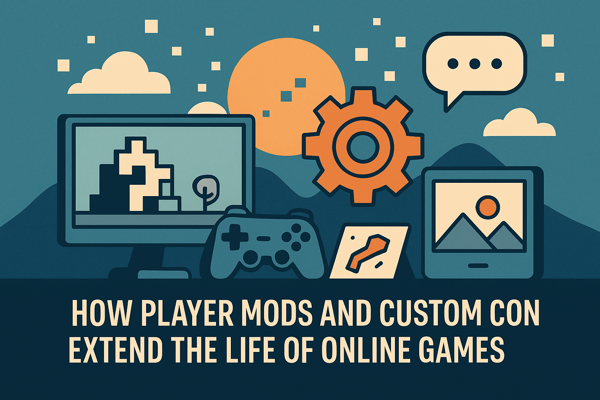Online games are constantly evolving. Some titles stay popular for a few months and then fade away, while others seem to live on for years—or even decades. One of the key reasons for this longevity? Player mods and custom content.
From new weapons and skins to entirely new game modes or overhauled maps, user-generated content breathes new life into online games. In many cases, it’s the players—not the developers—who keep a game relevant long after its original release.
In this article, we explore how mods and custom content transform online games into lasting digital communities and why empowering players to create is one of the smartest moves a developer can make.
What Are Mods and Custom Content?
Mods (short for “modifications”) are player-created changes or additions to a game’s original design. These can range from small tweaks—like a custom character skin—to full-blown expansions that introduce new quests, maps, and mechanics.
Custom content is a broader term that includes any player-made material, such as artwork, user-generated levels, voice packs, and even entirely new stories using the game’s engine.
These additions are usually made using developer-supported tools or unofficial community editors. Some games fully support mods, offering dedicated marketplaces or creation kits, while others leave it to the community to figure out.
Why Mods Matter: Key Benefits for Online Games
Mods and custom content offer a wide range of benefits—for players, developers, and the game’s longevity.
🎮 They Keep the Game Fresh
New content means new reasons to come back and play. Even a game that’s years old can feel brand new when you add a new map, class, or mission. Mods allow games to evolve far beyond what the original developers planned.
🤝 They Build Strong Communities
Modding encourages collaboration, creativity, and feedback. Players share their creations, test each other’s work, and support ongoing development. This fosters a passionate, loyal user base that invests emotionally in the game.
🧱 They Fill the Gaps
Not every developer has the time or resources to include every requested feature. Mods can provide fixes, interface improvements, or niche features that developers missed or didn’t prioritize.
📈 They Attract New Players
When a game becomes a platform for creativity, it naturally gains attention. Gamers who want something different are drawn to titles with strong modding communities.
🕹️ They Encourage Replayability
The more variation a game offers, the more likely players are to return. With an active modding community, no two sessions need to be the same.
Notable Games That Thrive Thanks to Mods
Here are a few standout examples of online games that owe their long-term success in large part to modding:
- Minecraft – Possibly the king of custom content. With thousands of mods ranging from texture packs to entirely new game modes (like Pixelmon or SkyFactory), Minecraft has endless replay value.
- Skyrim (Elder Scrolls Online included) – While not purely online, the Skyrim modding community is legendary. Even after a decade, players still create new content that pushes the boundaries of what’s possible.
- Garry’s Mod – A sandbox game built almost entirely on mods. It’s less a game and more a toolkit for creating anything you can imagine.
- ARK: Survival Evolved – The Steam Workshop is full of community mods that range from quality-of-life tweaks to massive dinosaur expansions.
- Counter-Strike – Originally a mod for Half-Life, Counter-Strike itself proves how powerful user-generated content can be when it grows into a standalone phenomenon.
How Developers Support (or Restrict) Modding
Support from developers plays a huge role in how active a game’s modding scene becomes. Successful games often include:
- Modding tools and editors
- Steam Workshop or mod portals
- Tutorials and documentation
- Mod-friendly game architecture
- Clear guidelines and legal support
On the other hand, some games limit or even prohibit mods to preserve balance, security, or monetization strategies. In such cases, the community may still find workarounds, but growth is slower.
The Future of Modding in Online Games
As technology evolves, so do the tools available to modders. With AI, procedural generation, and open-source engines, the possibilities are growing rapidly. Some developers even hire top modders to join their teams or turn popular mods into official game content.
Modding is also moving toward cross-platform support, meaning console players may soon enjoy the same creative content as PC users—a long-awaited shift.
Meanwhile, monetized modding platforms allow creators to earn money, offering even more incentive for quality and innovation.
Final Thoughts
Player mods and custom content are more than just add-ons—they’re the heartbeat of many online games. They allow communities to take ownership of the experience, adapt it to their needs, and keep the world alive long after the developers have moved on.
For gamers, mods offer creativity and control. For developers, they provide longevity and loyalty. And for the gaming industry as a whole, they prove one powerful idea: the players themselves are often the best game designers.
Stay with us as we continue to explore how creativity, community, and collaboration shape the future of gaming—one mod at a time.

